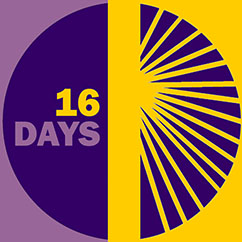(November 25 – December 10, 2011)
All over the world, young women are taking to the streets to protest gender-based violence. According to the United Nations, up to 70% of all women experience gender-specific violence in their lifetime. In countries like Zimbabwe and Honduras where governments routinely crack down on democratic expression, women are taking a stand, often risking their lives to demand a halt to militarization, corruption, impunity and economic injustice that fuel violence against women.
This year, to celebrate 16 Days of Activism – themed “From Peace in the Home to Peace in the World: Let’s Challenge Militarism and End Violence Against Women!” – JASS mobilized to feature the voices and action of young women – from the Feminists in Resistance in Honduras confronting militarization and young feminists in Zimbabwe and Swaziland coming out in their numbers against rape and domestic abuse to JASS Southeast Asian activists fighting for justice and equality in their “One Fight, One Voice” campaign.
16 Days of Activism Against Gender Violence
The 16 Days of Activism Against Gender Violence is an international campaign initiated by the Center for Women’s Global Leadership (CWGL) in 1991 to raise awareness about gender-specific violence. The 16-day campaign starts with the International Day Against Violence Against Women (November 25) and ends on International Human Rights Day (December 10) in order to symbolically link violence against women and human rights and to emphasize that such violence is a violation of human rights.
The Seven Deadly Sins in the Philippines
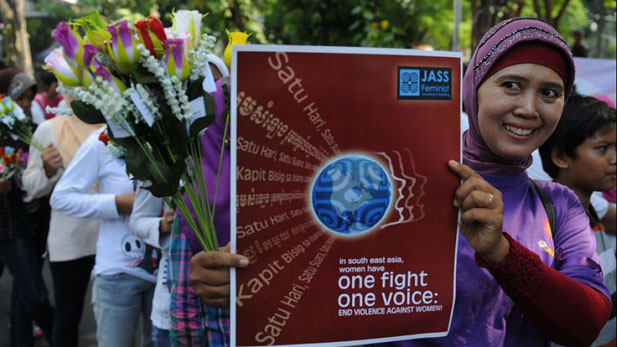
As part of JASS Southeast Asia’s One Fight, One Voice campaign, 33 women representing 33 organizations involved in JASS-Philippines put on a photo exhibit called, “The Seven Deadly Sins” to draw attention to the seven types of violence faced by women: rape and incest, domestic violence, sexual harassment, discrimination in the workplace, inaccessibility of health services, violence directed at sex workers and sex trafficking, and state-instigated violence. “In spite of the 37 laws and executive orders in place to protect women’s needs and rights, the Center for Women’s Resouces (CWR) has reported a 47% increase in violence against women and children in our country. YetNewsweek ranks the Philippines as the 17th best place to be a woman,” says Mary Joan Guan, Director of CWR. The exhibit was displayed in the the lobby of Congress and circulated to universities and other city halls in Manila to reach thousands of people.
“On this day help me salute every woman who has worked tirelessly to contribute to the struggle for women’s rights in Zimbabwe and the world over. It hasn’t been an easy road. Many of us have been attacked physically, others called names, have been arrested, some have lost friends – all in the fight for a better life for women. On this day I once again reaffirm my commitment to continue stand up for the rights of women and girls without any apology. I also reaffirm my commitment to fighting for a democratic Zimbabwe.”
~Cleopatra Ndlovu, Zimbabwean women’s rights activist & Women and Men of Zimbabwe Arise (WOZA) member
Code Red Against Rape in Zimbabwe
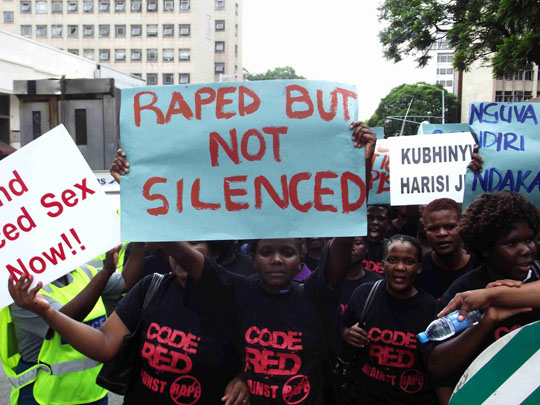 “16 Days is a time to reflect and remember the link between the violation of women’s rights and human rights,” says Theresa Matvsai, a young feminist and member of Katswe Sistahood in Zimbabwe. This year, Katswe’s campaign to “End Forced Sex Now!!!” kicked off with a 1000-strong Code Red Against Rape peaceful march on November 25th in Zimbabwe’s capital, Harare – not an easy feat with government intimidation and suppression of citizen action. The campaign speaks out against apathy to injustices on women’s bodies by confronting sexual and gender-based violence, especially rape. As part of Katswe’s regional strategy with allies, including OSISA, YET (Youth Empowerment and Transformation Trust) and JASS, the campaign pledges to “organize for women’s justice around the Southern African region by marching, lobbying and making noise about our rage until our nations change their systems and attitudes about rape.”
“16 Days is a time to reflect and remember the link between the violation of women’s rights and human rights,” says Theresa Matvsai, a young feminist and member of Katswe Sistahood in Zimbabwe. This year, Katswe’s campaign to “End Forced Sex Now!!!” kicked off with a 1000-strong Code Red Against Rape peaceful march on November 25th in Zimbabwe’s capital, Harare – not an easy feat with government intimidation and suppression of citizen action. The campaign speaks out against apathy to injustices on women’s bodies by confronting sexual and gender-based violence, especially rape. As part of Katswe’s regional strategy with allies, including OSISA, YET (Youth Empowerment and Transformation Trust) and JASS, the campaign pledges to “organize for women’s justice around the Southern African region by marching, lobbying and making noise about our rage until our nations change their systems and attitudes about rape.”
Honduran Women say: “Our Bodies are Not a Battleground!”
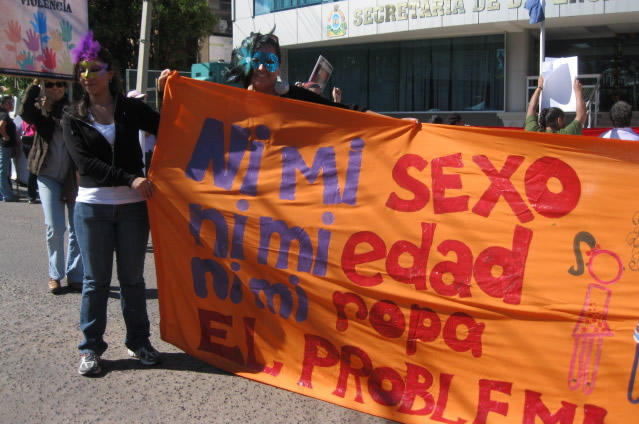 On November 25th, JASS’ Honduran ally, Feminists in Resistance, a JASS ally, joined dozens of women’s organizations and Honduran women in a nation-wide protest in front of the Department of Defense in Tegucigalpa. In a country where soldiers with assault rifles patrol neighborhood streets, over 500 women marched under the banner: “Our bodies are not a battleground, end militarization now!” This action was coordinated by La Articulación Feminista 25 de noviembre. For more in Spanish, read Daysi Flores’ blog.
On November 25th, JASS’ Honduran ally, Feminists in Resistance, a JASS ally, joined dozens of women’s organizations and Honduran women in a nation-wide protest in front of the Department of Defense in Tegucigalpa. In a country where soldiers with assault rifles patrol neighborhood streets, over 500 women marched under the banner: “Our bodies are not a battleground, end militarization now!” This action was coordinated by La Articulación Feminista 25 de noviembre. For more in Spanish, read Daysi Flores’ blog.
“It doesn’t matter where our strength comes from, we are all living in the territory we call our bodies. And it is with our bodies that we make ourselves present on the streets and all over the world on the 25th of November to proclaim that history accompanies us and that we will not give up the fight against violence until no woman suffers. MY BODY IS NOT A BATTLEGROUND, STOP THE MILITARIZATION NOW!” ~ Daysi Flores, Honduran activist and JASS Mesoamerica’s Communications Coordinator
Painting the Park Pink” Campaign in Swaziland
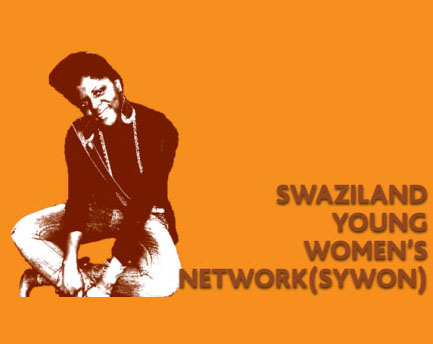 In Swaziland, where at least a third of girls have experienced sexual violence at home by age 18, the women of the Swaziland Young Women’s Network(SYWON) are taking action to confront cultural beliefs that perpetuate violence against women. SYWON launched the provocative Painting the Park Pink campaign on November 26th, calling on young women and men, including local celebrities, to take to the streets in high heels, a symbol of the “pain and discomfort that women who experience abuse feel.” Many men’s groups who pledged to come didn’t show up in fear of ridicule following negative media attention. This was not surprising given the conservative traditions of this country still ruled by a King. That didn’t stop the 30 young women and one man of SYWON from marching through Mbabane in protest against domestic and sexual abuse.
In Swaziland, where at least a third of girls have experienced sexual violence at home by age 18, the women of the Swaziland Young Women’s Network(SYWON) are taking action to confront cultural beliefs that perpetuate violence against women. SYWON launched the provocative Painting the Park Pink campaign on November 26th, calling on young women and men, including local celebrities, to take to the streets in high heels, a symbol of the “pain and discomfort that women who experience abuse feel.” Many men’s groups who pledged to come didn’t show up in fear of ridicule following negative media attention. This was not surprising given the conservative traditions of this country still ruled by a King. That didn’t stop the 30 young women and one man of SYWON from marching through Mbabane in protest against domestic and sexual abuse.

